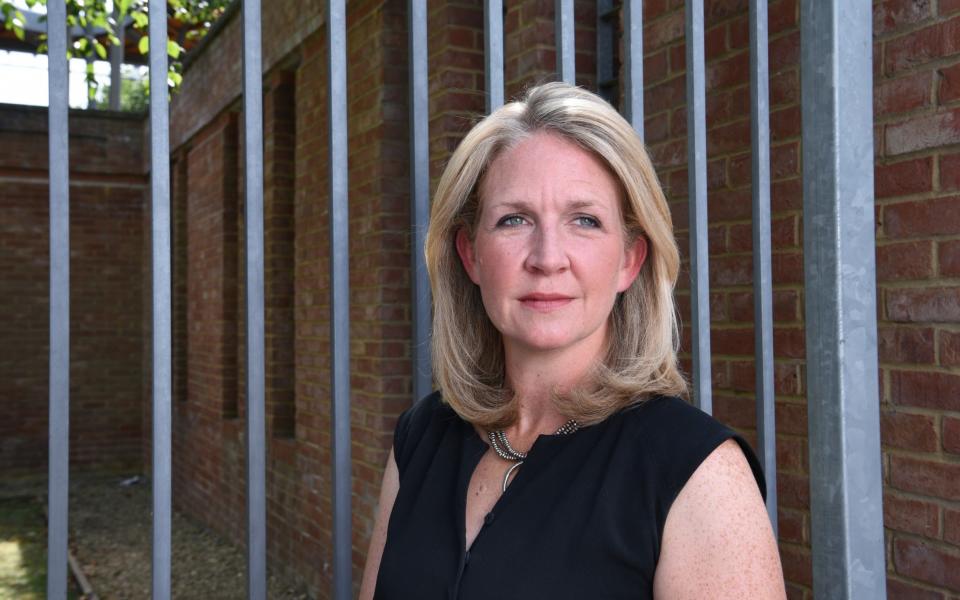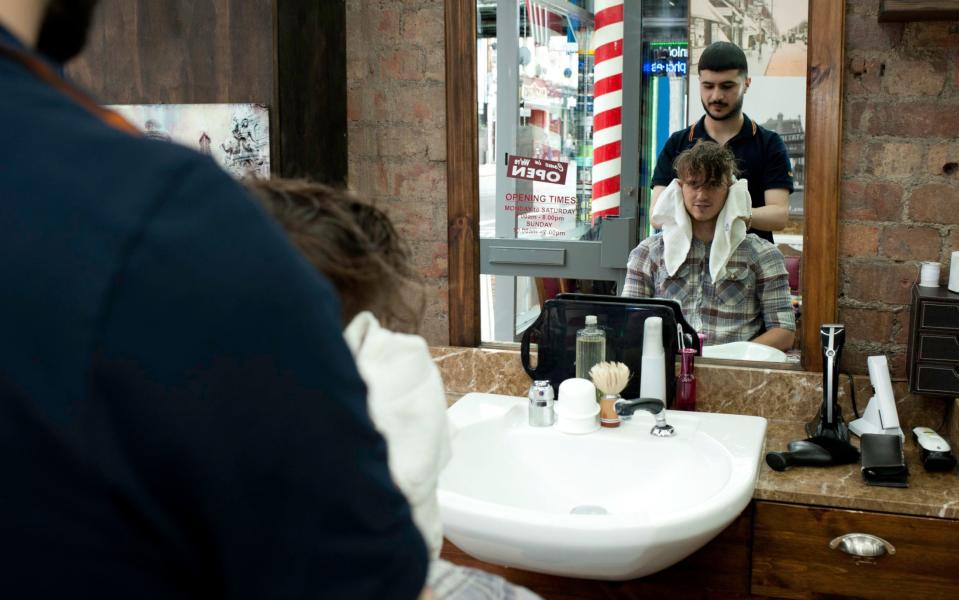Promising everything from a quick buzz cut to beard shaping and scalp massages, the barber shop’s red and white-striped pillar is a staple of the British high street.
As men’s grooming became more common, the number of barber shops exploded.
According to the National Hair and Beauty Federation (NHBF), there are 17,702 facilities operating across the country, a 50 percent increase since 2018, with 918 new establishments opening last year alone.
But experts warn that behind their no-frills exteriors, many barber shops are involved in human trafficking, forced labor, drug dealing and money laundering.
Detective Superintendent Charlotte Tucker of Wiltshire Police, the officer behind the UK’s first child modern slavery investigation, says buying cut-price haircuts risks lining the pockets of criminal gangs who exploit workers for profit.


“If something is really cheap, like a £10 haircut in London, then that could be a red flag that workers are being underpaid or not paid at all.”
The average price of a haircut and beard trim is £19, according to consumer data platform Statista.
But the number hides wide regional differences, with some haircuts selling for as little as £5 in the North East, while in the more popular neighborhoods of West London you can pay more than £100.
“Everyone likes a bargain,” adds DS Tucker. “But if something feels too good to be true, it probably is.”
‘Cycle of misery’
There are at least 100,000 victims of modern slavery and human trafficking in the UK, according to official estimates.
Traffickers exert emotional or economic control over workers, who are often low-skilled and cannot speak English, by paying them below the legal minimum to increase their profits.
If the criminal gang or individual has paid for the worker to travel to England, they will take advantage of this “debt bondage” to ensure the worker does their bidding. “This perpetuates a cycle of misery,” says DS Tucker.
Nail salons, nail salons and car washes have traditionally been centers of human trafficking operations.
DS Tucker’s two-year investigation into the forced labor of Vietnamese teenagers in nail salons in Bath and Burton-on-Trent has resulted in three convictions.
Young salon workers were trafficked to England and forced to work 60 hours a week for little or no pay.
But while barber shops may receive less attention, the lack of supervision and the cash-in-hand nature of the trade make it equally suitable for illicit employment, according to Justine Currell, director of modern slavery charity Unseen.
“We have experienced many cases of abuse in barber shops. For example, the ability to rent chairs and the temporary nature of the job. You can have workers come and go.
“This is a quick cash transaction. “Even if it’s not just cash, we see people being exploited, working long hours and not getting paid the amount they expected to get.”
Unseen identified 30 cases of labor abuse and modern slavery related to barber shops and hair salons between 2016 and 2023; five of these occurred last year.
‘Drug activity, money laundering and wider corruption’
Ms Currell suggests that the recent proliferation of barber shops reflects a shift in how criminal gangs operate.
“Most media attention has focused on nail bars and car washes,” he says.
“But it’s like Whack-a-Mole. You start cracking down on one area and criminal gangs show up elsewhere and you realize you didn’t stop it, you just displaced it.
“And [the criminals] Think, ‘OK, you’ve got your eye on the ball in this area, so let’s move somewhere else.’ “We’re seeing this happen.”
He adds that modern slavery in barber shops can go hand in hand with other forms of crime.
“Drug activity, money laundering, wider corruption are all taking place behind what is perceived as a legitimate high street business on your doorstep, overshadowing a host of criminal activity, including the exploitation of workers.”
Although most barber shops are legitimate and law-abiding businesses, some are linked to criminal gangs who make money by smuggling immigrants into the UK.
The National Crime Agency’s (NCA) investigation in 2022 found that an Afghan barber was using his barber shop in Cricklewood, north-west London, as a front for human trafficking.
Gul Wali Jabarkhel was offering lorry drivers thousands of pounds to bring people to the UK illegally from France and Belgium. He was sentenced to 10 years in prison along with his three partners.
George Voloshin, an anti-money laundering expert at the Association of Certified Anti-Money Laundering Specialists, says illegally operating barber shops are “very often” run by organized crime groups from ethnic minority backgrounds.
He adds: “Barbershops are often owned by individuals from the Middle East, including Turks and North Africans, as well as Kurds.”
According to DS Tucker, the recent increase in the number of barber shops has raised the possibility that some of these operations, including small boats across the Channel, are fronts for people smuggling.
“It makes sense that there is a connection between the two,” he says.
What to pay attention to
If you’re getting your hair cut at the barber’s, there are a few things to look out for that could indicate your money is benefiting criminal gangs, according to DS Tucker.
“If it looks like there are a number of different staff working there, and they look tired, disheveled and miserable, this could be a sign of exploitation.
“If you don’t pay your staff properly, you can undermine competition. “This feeds a cycle of organized criminals making money by not playing by the rules.”
If the business insists on only taking cash payments, this can also be a cause for concern.
The National Crime Agency’s anti-modern slavery initiative – “Operation Aident” – investigates facilities suspected of housing exploited workers.
But DS Tucker says police can only do so much.
“We really depend on public reporting. It’s about customers shouting it out.
“This is not a problem you can get the police out of. It is not that there is no will to eliminate guilt, but it is very difficult to detect.
It adds that anyone who suspects illegal behavior can call Crimestoppers or 101 or submit community intelligence via the local police website.
“[The customer] We can say they went to a barber shop and it only cost £10. “There were also other signs that workers were not being treated properly.”
under the radar
While there is no evidence that a minority of barber shops operate illegally, they can be an attractive option for criminals looking to launder the proceeds of crime.
Money laundering involves transferring ill-gotten gains onto a business’s books and making it appear as legitimate income by paying taxes on it.
Mr Voloshin says barber shops are a “classic example” of front businesses for money laundering.
“There may be barber shops, small shops, laundries, souvenir shops, in short, cash-intensive businesses. These are often used to launder dirty money.
“It could be gambling, drug trafficking, human trafficking, prostitution, extortion, anything like that,” he adds.
“Cash is difficult to trace and criminals hoard large amounts of cash in small amounts. These establishments are legitimate in the sense that they have real customers, but they often inject some dirty money into the clean money when calculating profits.


According to Ms. Currell, one method frequently used by “rogue businessmen” is to open one business after another.
“When you look at Companies House, their directorates are everywhere,” he says.
“You have a model where one or two people try to make as much money as possible, then close the business and start a new business under a different name. We have seen this very often. “They are gaming the system.”
Mr. Voloshin says this is perfectly logical.
“From a bank’s perspective, they will see customers deposit cash on a daily or weekly basis. If the bank sees a large increase in cash injections, this could be flagged as suspicious.
“So for a criminal who runs a barbershop and wants to launder drug money, it would make much more sense to open a barbershop nearby rather than invest more money in his previous business, so that there is no red flag on the bank’s radar.”
An HMRC spokesman said: “We routinely work with our partners to tackle a range of compliance risks across business sectors.
“While we cannot discuss identifiable businesses, we take all reports of malpractice extremely seriously and are taking firm action to ensure everyone pays their taxes.”
NHBF chief executive Caroline Larissey said: “Whilst NHBF recognizes that a small number of barber shops may be involved in illegal practices, the sector is the most robust on the high street.”
An NCA spokesman said: “While most high street businesses are completely legitimate, organized crime groups may attempt to use businesses to conceal their activities or launder the proceeds of crime.
“Companies that generally trade in cash are among the companies that can be exploited in this way.”
Recommended
How much is your coffee habit really costing you?
Read more